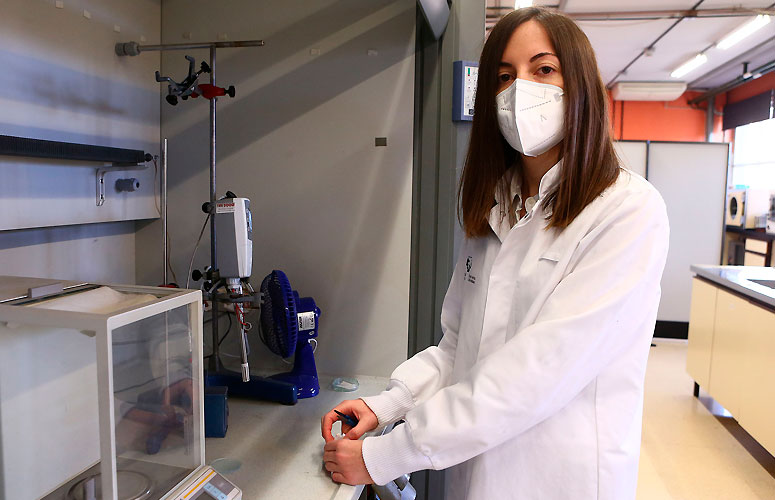A chemically recyclable biodegradable polymer for food packaging
First publication date: 28/12/2020

The proper packaging of food is essential for guaranteeing its quality and safety. Yet plastic containers are not well looked upon owing to the amount of waste that is generated a posteriori. In this respect, a study by the UPV/EHU has for the first time synthesised a chemically recyclable biodegradable polymer for use in food packaging.
Right now, polymers are very widespread in our daily lives. And the fact is that most of them are known as plastics and are used in a whole range of sectors, such as the car industry, medicine, building, etc. Another very important sector is food packaging. The most widely-used materials in packaging are poly (ethylene) and poly(ethylene terephthalate) because of their excellent physical properties and low cost. However, once used they are thrown away and persist for many years before becoming degraded, which causes them to build up in the environment and create a huge problem.
“One alternative to this problem is the use of biodegradable polymers. Biodegradable polymers degrade in the presence of carbon dioxide, water, methane, inorganic compounds or biomass. So no waste is produced,” said Ainara Sangroniz-Agudo, researcher in the UPV/EHU’s Department of Polymer Science and Technology.
“Biodegradable polymers tend to display poor barrier properties,” said Sangroniz. “In fact, gases and vapours pass from the environment into the container and vice versa until the food deteriorates, and they have low flexibility, in other words, they are brittle.” So “they need to be transformed to be of any use in food packaging. There are various strategies designed to improve all these physical properties: they can be blended with another polymer, other additives can be added or else new chemically recyclable biodegradable polymers can be synthesised,” she added.
“Firstly, we blended the biodegradable poly (adipate–co-terephthalate butylene) polymer with phenoxy resin, which has good barrier properties. We saw that the new blend displays a high barrier feature and some exceptional mechanical properties. What is more, the degradation speed of the blend is equal to or greater than that of other biodegradable polymers,” explained Ainara Sangroniz.
Apart from that, “one of the biodegradable polymers is poly (lactic acid). However, this polymer has high rigidity and is of a low barrier nature. So various nanoparticles were added to improve its barrier properties. In fact, the nanoparticles prevent vapours and gases from infiltrating,” pointed out Sangroniz.
Finally, “we synthesised chemically recyclable polymers that are also biodegradable. Polymers are long chains formed by the bonding of small molecules (monomers), and in the case of these polymers, the monomer can be reused after the polymer has been used for resynthesizing the material. That way no waste is generated and the process can be repeated as many times as one wishes,” said the UPV/EHU researcher. “Two polymers with complementary features (poly (gamma butyrolactone) and poly (trans-hexahydrophthalate) were combined for this work to produce a new co-polymer. This copolymer can be chemically recycled and the original monomers are obtained,” she added.
The researcher highlighted the fact that “the chemically recyclable copolymers that we synthesised in this work display excellent barrier properties and flexibility, very similar to the currently used materials on the market, so they could be replaced in the future. But to do this the process needs to be made more cost-effective as right now it remains very costly”.
Additional information
This research was conducted within the framework of the PhD thesis by Ainara Sangroniz-Agudo (Elgeta, Basque Country, 1991), entitled "Towards sustainable polymer packaging materials: from biodegradable to chemically recyclable polymers/ Ontzigintzarako material polimeriko jasangarrien garapena: polimero biodegradagarriak eta kimikoki birziklagarriak". It was supervised by Agustín Etxeberria-Lizarraga and Marian Iriarte-Ormazabal, lecturers in the Department of Polymers and Advanced Materials: Physics, Chemistry and Technology. The research was conducted in collaboration with the University of Colorado in the United States.


